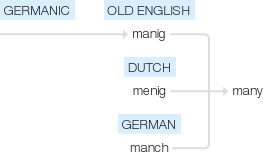Many
Old English manig, of Germanic origin; related to Dutch menig and German manch .
wiktionary
From Middle English many, mani, moni, from Old English maniġ, moniġ, maneġ(“many”), from Proto-West Germanic *manag, from Proto-Germanic *managaz(“some, much, many”).
etymonline
many (adj.)
"being or consisting of a large number of units or individuals," Middle English mani, manige "indefinitely numerous, many a, much," from Old English monig, manig, from Proto-Germanic *managaz (source also of Old Saxon manag, Swedish mången, Old Frisian manich, Dutch menig, Old High German manag, German manch, Gothic manags), perhaps from a PIE *menegh- "copious" (source also of Old Church Slavonic munogu "much, many," Old Irish menicc, Welsh mynych "frequent," Old Irish magham "gift"), or perhaps a northern European substratum word also borrowed in Uralic (compare Finnish moni).
The pronunciation was altered by influence of any (see manifold). Middle English had comparative and superlative manier, maniest, also an adverbial form manygates "in many ways." Many honden maken liʒt werk is in "How the Good Wife Taught Her Daughter" (c. 1350).
The angels keep their ancient places—
Turn but a stone, and start a wing!
'Tis ye, 'tis your estrangèd faces,
That miss the many-splendored thing.
[from "In No Strange Land (The Kingdom of God is within you)" by Francis Thompson, 1907]
many (n.)
"an indefinitely large number; a crowd, many persons," Old English menigu, from a prehistoric Germanic word from the source of many (adj.). Compare Old Saxon menigi, Gothic managei "multitude, crowd," Old High German managi "large number, plurality," German Menge "multitude." The many "the multitude, the mass of people, the common herd" is attested from 1520s.
